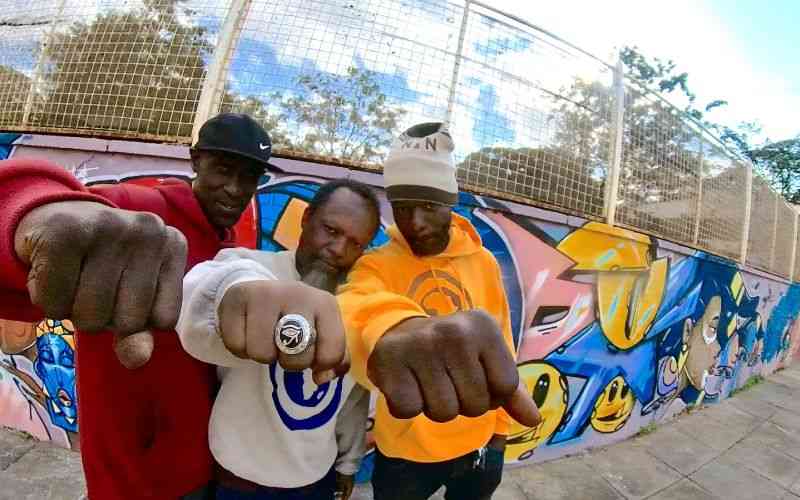
For over two decades, Kalamashaka has played a pivotal role in revolutionizing the hip-hop scene in Kenya. In the 1990s, the trio of Paul Ngige alias 'Kama', Robert Mtumbai alias 'Roba the Oteraw', and Johnny Vigeti alias 'Johnny' reigned supreme.
Their unique style and powerful lyrics brought about a significant shift in the perception of hip-hop music in the country.
Their approach to hip-hop not only changed the face of Kenyan music but also sparked a cultural movement that continues to shape the country's artistic landscape.
Their lyrics were innovative, rapping in sheng over hard-hitting beats. Their rapid-fire flow and gritty, confrontational delivery was unlike anything that came before.
Kalamashaka tackled issues affecting Kenyan youth like crime, police brutality, poverty, and government corruption. Their abrasive, rebellious style, socially-conscious lyrics served as a catalyst for the hip hop movement in Kenya. This led to their immense popularity at the time.
They were seen as rebellious. They wore dreadlocks at a time the hairstyle was associated with crime.
"I would say that Kalamashaka were the earliest socio-political conscious group that advocated for a lot of concerns. They came from a point of information and they voiced it out intelligently. For all those years that they have been in the industry despite their personal challenges, Kalamashaka has definitely lived up to their name to date and we celebrate them," says David Muriithi aka DJ D-Lite who was Kalamashaka's manager between '97-2000.
"Through them, Ukoo Flani was born and this blew up to be an entire movement by itself and by that alone shows the impact Kalamashaka had. Although they went under for a while, they are now reinventing themselves and we are waiting to see them probably rewriting history for the second time" he adds.
Forming of Kalamashaka
The three 'musketeers' from Dandora started their journey freestyling in clubs and competitions. Roba then was going by the moniker G-flava, and Johnny's aka was Corrupt. This duo had been going at it for a while as a group called Natural Born Killers.
On the other hand, Kama was on his own, under the moniker Spice G. The two factions, would compete on different stages until later in life they came together as a unit, as 3D- Crew.
At that time, as Kama highlighted in an interview with a local Youtuber, Kenyan hip hop was unheard of and in most places they would perform, they got mixed reactions from the audience.
They continued battling other contestants and would win every competition to the point that they wouldn't get any more competition gigs. They later changed their name to Kalamashaka. This was after they entered in a star search. The group hailing from Dandora was as raw as it comes to the point that most producers as well as mainstream media refused to play their songs. This was because they mostly addressed issues that rubbed the wrong way with the government of the time.
From financial struggles to finally being a darling to many, Kalamashaka defied all odds and this in turn came as a blessing as it got them to bigger platforms.
Kalamashaka started their musical journey in 1997. This was at a time when the country was in a transformational stage heading towards multi-partyism. The country was at rage, police brutality was a common thing and AIDS was the newest scare.
A combination of these factors might have mainly influenced Kalamashaka's style of rap, gaining an audience became easy since people could relate to their music.
Their talent was discovered by Tedd Josiah who was a gospel music producer, he felt like working with artistes with a new style. Each had their own personality and style that they combined to come up with their unique style.
Their popular hit 'Tafsiri Hii' that dropped the same year was the one that made them earn their place in the industry. The spotlight was now on them and fans were eager for new music. As my fellow scribe Oyunga Pala wrote six years ago, 'the influence of Tafsiri Hii was far-reaching. A new breed of local talent emerged in their wake with ferocity. Tedd Josiah was not going to ride this wave alone. Bruce Odhiambo would introduce Poxi Presha with his seismic Dholuo rap, K-South, a duo that included Bamboo and Doobiez aka Abbas Kubaff and Mercy Myra. The new wave of artiste proudly represented their hoods. From Dandora, Kariobangi, Kayole, to Githurai.'
Kalamashaka's hits 'Tafsiri Hii', 'Ni Wakati', 'Fanya Mambo', 'Dandora Love', 'DC na CC' and 'Piga Bao' made them travel overseas far beyond their wildest dreams. They were also the first hip hop musicians to perform for international rap stars, among them Coolio and Lost Boyz.
From living in Dandora to performing abroad in countries like Holland, Nigeria, Sweden, and more, they were truly living their dream.
They became the first Kenyan group to land an award winning advert by PSI organisation, in 1999, after the Benson and Hedges, "Golden Tones" concert in 1998, UNFPA (United Nations Population Fund) in Nigeria that saw more than 80,000 turn up for the event.
"Their rugged style that sounded like American hip hop group, Lost Boyz, set them apart in the sense that their powerful lyrics captured the frustrations of an entire generation of young people locked away in urban ghetto squalor and embodied their aspirations of escaping poverty to seek a better life," explained renowned music producer Tedd Josiah in an interview with Standard Entertainment.
This talented group paved the way for Swahili rap to be embraced and to be mainstream music in the country. In 2001, they dropped their first studio album 'Ni Wakati', which was well received by music fans across the country and outside the country as well.
This album was philosophical since it addressed the challenges that were being faced then such as, street crime, tribalism, politics and Africa's conflicts. Everyone that had a listen instantly related to it and this helped them when it came to matters concerning album sales.
However, for every sunrise, a sunset is always there and the fame and popularity that they had gained over the years started to wane. Their interest in music faded and they found themselves isolated and stereotyped as radicals. They made many unsuccessful attempts to replicate their earlier successes to no avail.

However, in 2008, they dropped another album called 'Mwisho wa Mwanzo' that did not get that much traction.
They eventually took a musical break as a group, but this year as they are marking 25 years in the industry as well as hip hop marking its 50th anniversary this weekend, the group released two tracks; 'Hatufi Leo' and 'Binadamu'.
Fast forward to last night, (Friday night) hip hop enthusiasts, music lovers, and cultural aficionados were treated to a one of a kind show where UnKut Africa and SK8CITY presented "The Blocc Party." The party commemorated 50 years of Hip Hop culture as well as set the stage for the upcoming UnKut Hip Hop Awards 2023.
The show was nothing, but an unforgettable night of creativity, self-expression, and unity.
This saw the organisers pay a special tribute to the hip hop pioneers and ultimately recognized them by awarding them the prestigious UnKut Hip Hop Awards 2023 Lifetime Achievement recognition.
This was an amazing experience for anyone who have been keeping tabs on Kenya's local hip hop, and we caught up with Roba.
"We were celebrating hip hop. We have come a long way since its inception and I will personally say that the industry has tremendously grown since we set the precedence. We choose to celebrate the culture and the growth so far, as well as celebrate the people we have mentored along the way" he says.
"The industry has grown, some have mastered their craft while many others are seemingly being pushed but all in all, Kenyan hip hop is on the right path," added Roba.
Asked whether they are planning a comeback, Roba says there are talks and plans underway.
Their lasting legacy
Kalamashaka's impact went beyond just their music. They inspired a new generation of artistes who were motivated to use hip hop as a platform for social change.
By challenging societal norms and addressing pressing issues through their music, their contributions continue to resonate with audiences and have left an indelible mark on the history of Kenyan music.
The impact of these trailblazing bunch of talented artistes goes beyond the canvas or stage; it extends into the hearts and minds of individuals who are moved by their work. Twenty five years later, their seminal influence on Kenyan music lives on.
 The Standard Group Plc is a multi-media organization with investments in media
platforms spanning newspaper print
operations, television, radio broadcasting, digital and online services. The
Standard Group is recognized as a
leading multi-media house in Kenya with a key influence in matters of national and
international interest.
The Standard Group Plc is a multi-media organization with investments in media
platforms spanning newspaper print
operations, television, radio broadcasting, digital and online services. The
Standard Group is recognized as a
leading multi-media house in Kenya with a key influence in matters of national and
international interest.
